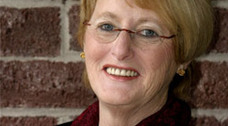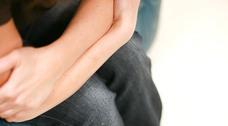2011-07-26

Marie-Andrée Laplante, dir. Phobies-ZéroHer heart was pounding, and she gasped for breath. A carefree stroll had suddenly become a nightmare. She was only 22 – surely too young for a heart attack! She ran into a drugstore. Then it was the hospital, and a barrage of tests, which all showed that she was in perfect health.
But the misery lasted for more than 20 years, to the point that, seven years after the first attack, Marie-Andrée Laplante was living in a cocoon, alone with her husband. She could no longer work, visit friends, or enjoy an outing. Finally, it was her beloved husband who found the explanation: agoraphobia.
At 67, Marie-Andrée is able to talk about this period in her life calmly and objectively – because, in 1991, it lead her to create Phobies-Zéro, an organization that is still helping hundreds of people emerge from the downward spiral of anxiety disorders.
“Phobies-Zéro’s mission is to break the isolation of people suffering from anxiety disorders, to set up support, self-help and information groups,” she says. “We also offer these services to families and loved ones, in addition to contributing to research in this field.”
Although the mysterious attacks continued, every doctor she consulted confirmed that she was in perfect health. She had to change jobs several times. Ten years after the first attack, while leafing through some American magazines, her husband came across some information about agoraphobia. Feeling almost certain that this was the answer, Marie-Andrée suggested this possibility to the doctors, psychologists, and psychiatrists she then consulted. It was a waste of time. They simply increased her medication.
“I began to have attacks at home, and my circle of friends dwindled,” she says. It was when she confided her suicidal thoughts to Lise, the only friend she had left, that Marie-Andrée escaped from this vicious circle. Short trips out on the balcony with Lise gradually allowed her to return to the job market and, after a relapse, she went back to school and was even able to enjoy the pleasures of travel again.
Advice and victories

The event that sparked the creation of Phobies-Zéro occurred during a board meeting at a women’s centre where Marie-Andrée was volunteering: after listening to the stories of women dealing with agoraphobia, she finally broke her long silence about her own experiences. “I offered them the help I had received from Lise,” she explains.
“The first self-help group was formed in 1991, and its first meeting was held in 1992,” says Marie-Andrée, who coordinates the groups and serves as the organization’s development officer.
Today, Phobies-Zéro counts ten support groups in various Quebec regions. The weekly meetings serve to educate and comfort the participants, giving them a place to talk about their experiences. During the meetings, tools are placed at their disposal, the process of systematic desensitization is explained, and discussions are held on specific subjects.
“The third step is when we hear about the victories,” adds Marie-Andrée. “When people talk about being able to go to the store to buy milk by themselves, for example.”
Participants also benefit from the advice of health care professionals who occasionally attend support group meetings. Camillo Zacchia, Ph.D., psychologist and senior advisor at the Douglas Institute’s Mental Health Education Office, is one of the guest speakers. He is vice-chairman of the organization’s board of directors and also serves as science advisor for research projects involving Phobies-Zéro, such as Zéro-ATAQ, a self-help program with peer support.
“These community organizations serve as kind of the front line in the field of mental health. Private sector resources are expensive. And anxiety disorders can be easily treated with the services offered by Phobies-Zéro. But these organizations need the support of experts to fulfil their mandate,” explains Camillo Zacchia.
An alternative approach
Marie-Andrée’s group offers an alternative approach, according to Micheline Lapalme, psychologist and interim coordinator at the Douglas’s Training and Internship Coordination Office and a fellow board member of Phobies-Zéro. “In fact we worked with them and ATAQ (Association des troubles anxieux du Québec) to develop a self-help program with peer support. For them, it’s a way to associate more closely with the profession,” she says.
Phobies-Zéro, which is funded partly by the Ministère de la santé and 75% through fundraising campaigns, also organizes meet and greet events during which people from other regions who are dealing with anxiety disorders can discuss their struggles and their remissions. Volunteers can be reached by phone five days a week, and there are also social events, training sessions and lectures. With all this going on, Marie-Andrée’s “baby” is now a full-grown adult with 90 volunteers and three permanent employees working hard to keep it afloat – and having trouble responding to all the cries for help.
“We need more staff and would also like to create more groups,” she says. Because we must hold out a helping hand to those who, like the young woman obsessed by the fear that she might stab her baby (impulse phobia) or Liette, who has been isolated by agoraphobia for twenty years, want to fight back against their enemy: fear. And like Marie-Andrée Laplante, who wrestled it to the ground. And who is here now to say that she is happier and more fulfilled than ever.


